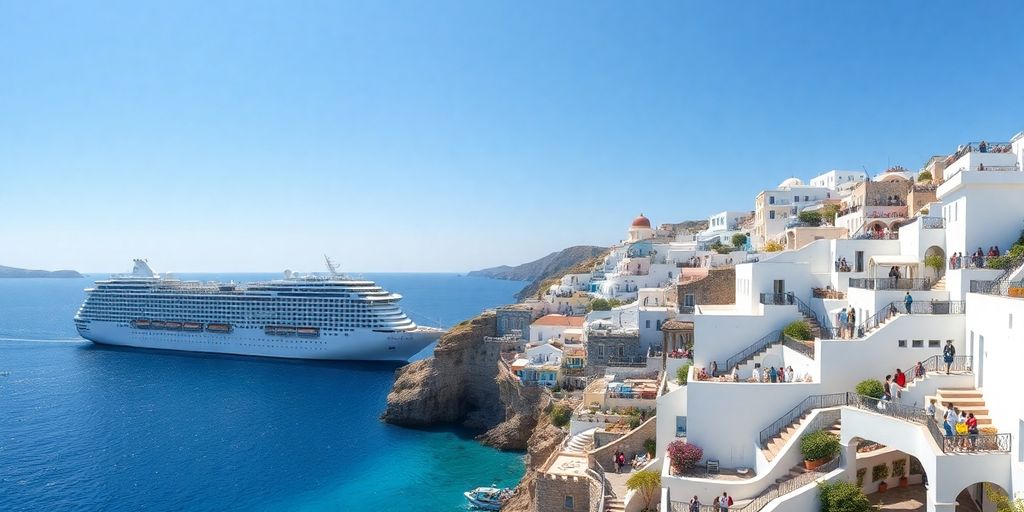Greece has implemented new taxes and levies on cruise visitors, particularly targeting popular destinations like Santorini and Mykonos. This measure aims to combat overtourism, alleviate strain on local infrastructure, and generate revenue for sustainable tourism initiatives. The tiered fee structure varies by season and port, reflecting a broader European trend to manage the impacts of mass tourism.
Greece Imposes New Cruise Taxes to Combat Overtourism
In a significant move to address the escalating issue of overtourism, Greece has introduced new taxes and levies specifically targeting cruise ship passengers visiting its most popular islands, including Santorini and Mykonos. The new fee structure, which commenced on July 1, ranges from €4 to €20 per person, depending on the season and the port of arrival. This initiative is a direct response to the overwhelming influx of tourists, which has placed immense pressure on the islands’ fragile ecosystems, infrastructure, and local communities.
Why the New Taxes?
The primary motivations behind Greece’s new cruise taxes are multifaceted:
- Overtourism Management: Islands like Santorini, with a population of approximately 15,000, attract around 2 million tourists annually. Mykonos also experiences similar pressures. The sheer volume of visitors, particularly from large cruise ships, leads to overcrowding, traffic congestion, and strain on public services.
- Infrastructure Improvement: The revenue generated from these taxes is earmarked for upgrading and maintaining the islands’ often-overstrained infrastructure, including ports, water supply, and waste management systems.
- Environmental Preservation: The taxes aim to mitigate the environmental impact of mass tourism, including pollution and resource depletion, by promoting more sustainable tourism practices.
- Support for Local Communities: The policy seeks to rebalance the benefits of tourism, ensuring that local residents do not bear the brunt of negative impacts such as rising rental costs and strained resources.
Key Takeaways
- Tiered Fee Structure: The tax varies based on seasonality and port congestion:
- Peak Summer (June 1 – September 30): €20 per passenger for Mykonos and Santorini.
- Shoulder Season (October): €12 per passenger.
- Off-Peak Season (November – March): €4 per passenger.
- Less Congested Ports: Lower rates apply (e.g., €5 in high season, €3 in shoulder, €1 in low).
- Targeted at Cruise Ships: The levy specifically targets cruise passengers, with some operators, like Celestyal, arguing it’s unfair and primarily for tax collection rather than overtourism management.
- Public Reception: While some tourists and local shop owners believe the fee is negligible and won’t deter visitors, cruise operators express concerns about the added financial burden and competitive market.
- Broader European Trend: Greece’s move aligns with similar measures taken by other popular European destinations such as Venice, Barcelona, and Dubrovnik, which are also grappling with the challenges of mass tourism.
Impact and Future Outlook
The Greek government anticipates generating up to 50 million euros annually from these taxes, which will be reinvested into the islands. Officials hope the new policy will encourage cruise lines to reconsider itineraries, potentially opting for smaller ships or directing traffic to less crowded ports. The long-term effectiveness of this policy will be closely monitored, with the potential for adjustments to ensure sustainable tourism and the preservation of Greece’s iconic destinations for future generations.
Sources
- Greece Imposes Levy On Santorini Cruise Visitors, Marine Link.
- Greece’s Santorini Island Introduces Entry Levy On Cruise Visitors To Protect Local Infrastructure And
Environment, Travel And Tour World. - Greece imposes levy on cruise tourists visiting Santorini, Baird Maritime.
- [Greece Introduces New Cruise Tax to Manage Mykonos and Santorini Overtourism and Promote Sustainable Tourism
- Travel And Tour World](https://www.travelandtourworld.com/news/article/greece-introduces-new-cruise-tax-to-manage-mykonos-and-santorini-overtourism-and-promote-sustainable-tourism/), Travel And Tour World.
- Greece starts charging tourist tax on cruise passengers, The Economic Times.






